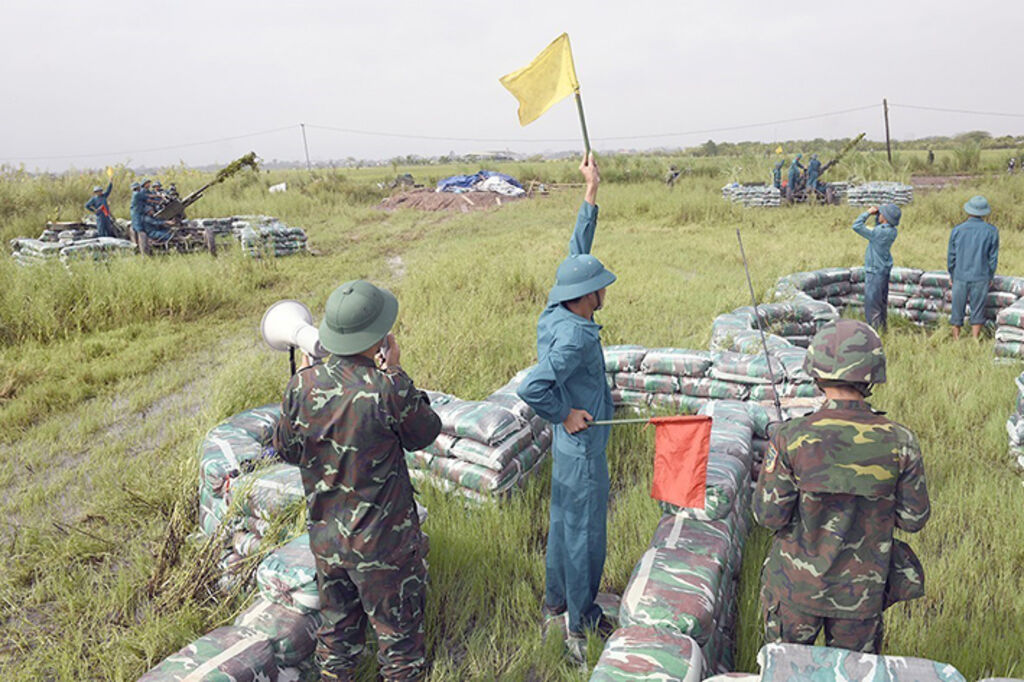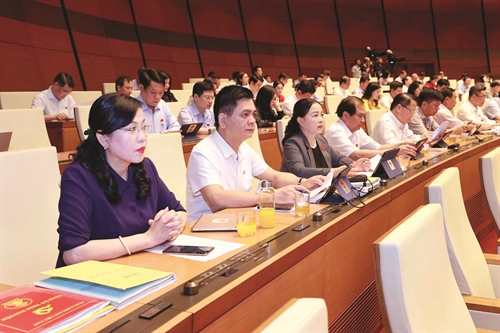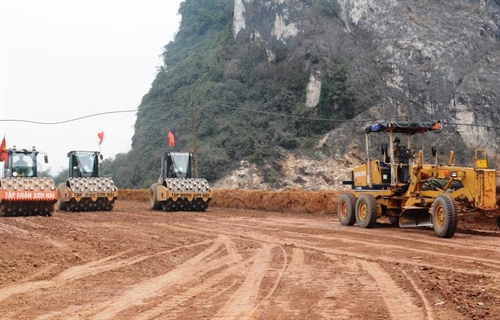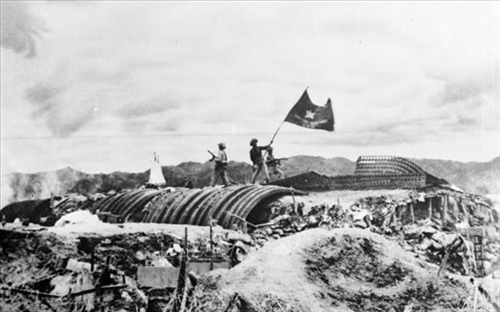 |
| A C-75M3 rocket in a live fire drill in 2022__Photo: Trong Duc/VNA |
Vietnam’s legal system on national defense and security is composed of normative provisions of the Constitution, laws and sub-law documents aiming at directly or indirectly regulating national defense and security relations arising in the performance of the functions of the State and the society. The legal provisions on national defense and security constitute a uniform whole, reflecting the close combination between the two strategic tasks of building and defending the socialist Vietnamese Fatherland and between socio-economic development and national defense-security maintenance.
Tran Quang Phuong[1]
Process of improving the legal system on national defense and security in Vietnam
From 1945 to 1975
In this period, the task of the entire Party, entire Army and entire People was to concentrate on defending the young revolutionary administration against internal enemies and foreign invaders, stabilizing security and order, developing production, carrying out the anti-French colonialist war, building socialism in the North while supplying human and material resources to the South in the war of resistance against the US imperialists and their lackeys for national independence.
In 1946 and 1959, the National Assembly promulgated two constitutions aiming to institutionalize the Party’s viewpoints and tasks, with provisions on national defense and security. The 1946 Constitution stated: Citizens were obliged to “defend the Fatherland” and “to join the Army”[2]. This content was further developed in the 1959 Constitution, according to which “Defending the Fatherland is the most sacred and noble obligation of citizens of the Democratic Republic of Vietnam. Citizen are obliged to do military service to defend the Fatherland”[3]; “Citizens of the Democratic Republic of Vietnam have the duty to abide by the Constitution, laws, labor disciplines, public order and social life rules”[4]; “The State forbids and punishes all acts of treason, opposing the people’s democratic regime, opposing the cause of national reunification”[5]; “The armed forces of the Democratic Republic of Vietnam are of the people, having the task to protect the revolutionary gains, defend the independence, sovereignty, territorial integrity and security of the Fatherland, protect freedom, happiness and peaceful labor of the people”[6].
According to incomplete statistics, in this period, seven laws and four resolutions of the National Assembly, and 10 ordinances of the National Assembly Standing Committee concerning national defense and security were promulgated, while the other documents were mainly decrees, circulars and orders (before 1953, they were mainly orders). Of these, the Resolution of the 4th session of the 1st National Assembly, dated March 26, 1955, on national defense, and the Resolution of the 6th session of the 1st National Assembly, dated January 18, 1957, on the struggle for national reunification, contributed to mobilizing the entire people to resolutely carry out the resistance war and national construction. Meanwhile, the 1958 Law on the Service Regime applied to Officers of the Vietnam People’s Army and the 1960 Law on Military Service (revised in 1962 and 1965) promptly encouraged the vast majority of youth to join the army for defending the Fatherland. A number of ordinances, decrees, circulars and orders on building of the People’s Public Security forces and assurance of political security and social order and safety were also proven as the tools for direct social management and crime prevention and combat, thus contributing to socio-economic development[7].
From 1976 to 1991
This was the period when the whole country was completely reunified and advanced to socialism. The Party’s resolutions focused on the two strategic tasks of building and defending the Fatherland. The Party’s viewpoints on national defense and security adopted at previous congresses were further completed and developed, especially after the 6th National Party Congress in 1986. The 1980 Constitution devoted the whole Chapter 4 to provide for the defense of the socialist Fatherland, while defining more specifically the obligations to defend the Fatherland and maintain political security and social order and safety[8].
In this period, the legislative activities concentrated on revising the Law on Military Service and the Law on the People’s Army Officers (in 1982 and 1991) in order to meet the requirements and tasks of defending the Fatherland. Meanwhile, competent authorities promulgated more than 10 ordinances and hundreds of decrees and circulars on national defense, security, social order and safety, building of the people’s police and people’s public security forces, etc. The 1985 Penal Code, though being not a specialized law on national defense and security, contained specific provisions on crimes, penalties and offenses of infringing upon national security[9]; crimes of infringing upon duties and liabilities of army men[10]; and crimes of sabotaging peace and opposing the mankind, and war crimes[11], practically contributing to crime prevention and combat in particular and national construction and defense in general.
From 1992 up to now
This is the period when the Party continues leading the comprehensive and synchronous renewal cause, advancing the country to socialism. The 1992 Constitution has new provisions on “building the national defense industry” and “combining national defense with economy and economy with national defense”[12].
Meanwhile, the 2013 Constitution affirmed for the first time: “The State of the Socialist Republic of Vietnam is the socialist law-ruled state of the people, by the people and for the people[13]. It defined more specifically the institution on defending the Fatherland, adding the provision on “building the national defense and security industry”[14].
On January 2, 2014, the 13th National Assembly Standing Committee issued Resolution 718, promulgating the Plan on organization of the enforcement of the 2013 Constitution, setting specific time frames (from 2014 to 2020) for submission to the National Assembly and National Assembly Standing Committees 13 draft laws and one draft ordinance concerning national defense and security.
Institutionalizing the Party’s viewpoints, particularly the viewpoints of the 13th National Party Congress (2021) on national defense and security, and concretizing the relevant provisions of the 2013 Constitution, other thematic resolutions of the Politburo[15], the number of legal documents on national defense and security promulgated in this period markedly increased with around 40 laws, 23 ordinances and seven resolutions of the National Assembly and National Assembly Standing Committee and many other laws and sub-law documents.
To meet the requirements of building the armed forces in the new period, the National Assembly revised the Law on Military Service (in 1994, 2005 and 2015), and the Law on People’s Army Officers (in 1999 and 2014), and promulgated the 2005 Law on People’s Public Security Forces (revised in 2015 and 2018). At the same time, most of the previous ordinances on building of components of the people’s armed forces, consolidation of the national defense and security potential, and management of social order and safety were developed into laws in order to promptly meet the requirements and tasks in each period. Many of the promulgated laws are of important significance in building the armed forces, defending national security and social order and safety, consolidating the national defense and security potential, and building the entire-population defense system and the people’s security posture, such as the 2003 Law on National Borders, the 2004 Law on National Security, the 2009 Law on Militia and Self-Defense Forces (revised in 2019), the 2013 Law against Terrorism, the 2018 Law on Cyber Security, the 2018 Law on the Vietnam Coast Guard, the 2019 Law on the Military Reserve Force, the 2020 Law on Vietnam Border Guard, the 2022 Law on Mobile Police, etc.
In order to affirm that Vietnam is a responsible member in the international community, on November 13, 2020, the 14th National Assembly promulgated Resolution 130 on Vietnam’s participation in peacekeeping forces of the United Nations, helping form a higher legal basis for the performance of this important external mission.
The National Assembly’s revisions of the 1996 Law on Promulgation of Legal Documents, or Law on Laws, in 2002, 2008, 2015 and 2020 with more specific provisions on formulating legal documents showed that this is one of the matters of great concern that may help raise the quality of formulating legal documents in general and legal documents on national defense and security in particular. The leaders of the Party, National Assembly and Government have regularly paid attention to the requirements of renewing and raising the quality of lawmaking activities, aiming to put an end to “frame laws”. Therefore, the formulation of laws in general and the laws on national defense and security in particular ensures strict compliance with the directing viewpoints of the Party and with laws, thus guaranteeing the quality of laws and gaining unanimity of National Assembly deputies. Particularly, the 2014 Law on Foreigners’ Entry into, Exit from, Transit through, and Residence in Vietnam and the 2015 Law on Military Service were voted for by all National Assembly deputies present at the session.
Bettering the legal system on national defense and security to meet the requirements of building the socialist law-ruled state
Having inherited and developed the viewpoints on defending the Fatherland, protecting national security and building national defense and security stated in the previous resolutions of the Party Central Committee and Politburo[16], the Resolution of the 13th National Party Congress has pinpointed: “To firmly maintain independence and sovereignty, further heighten the quality and efficiency of external activities and international integration; to enhance the national defense and security potential, building the People’s Army and the People’s Public Security forces to be revolutionary, regular, elite and incrementally modern with some forces advancing straight to modernization, striving for the target that by 2030, the People’s Army and the People’s Public Security forces will become revolutionary, regular, elite and modern; to resolutely, persistently and firmly defend national independence, sovereignty, unity, territorial integrity, seas, islands and airspace; to firmly maintain the environment of peace and stability for national development”.[17] These constituted important political bases for building and completing the legal system on national defense and security.
Based on the Resolution of the 13th National Party Congress, on July 27, 2021, the 15th National Assembly adopted Resolution 16 on the 2021-25 five-year socio-economic development plan, identifying: “To build the People’s Army and People’s Public Security forces to be revolutionary, regular, elite, incrementally modern, with a number of forces, corps and arms advancing straight to modernity; to firmly maintain political security, social order and safety, human security, economic security and cyber security. To stand ready to effectively respond to traditional and non-traditional security challenges so as not to fall into the state of being unprepared and not to let the formation of oppositional political organizations; to vigorously fight crimes and social evils. To synchronously and uniformly organize socio-economic development in combination with the building of the entire-population defense system and the entire-population defense posture with the strong people’s security posture. To intensify the protection of, and support for, marine economic activities as well as fishermen as fishing activities. To continue building and developing a dual-use national defense and security industry to be incrementally modern and closely combine diplomacy with national defense and security and in service of socio-economic development.
On October 14, 2021, the Politburo issued Conclusion 19-KL/TW on orientations for the legislative program of the 15th National Assembly, setting the specific objectives and requirements and mentioning the renewal and improvement of the quality of lawmaking activities. Later on November 5, 2021, the 15th National Assembly Standing Committee issued Plan 81 to implement Conclusion 19-KL/TW and the Scheme on orientations for the legislative program of the 15th National Assembly, clearly stating the specific objectives, requirements and responsibilities for every subject in lawmaking activities. Accordingly, this Plan identified the task of formulating 14 draft laws and one draft ordinance on national defense and security in the five groups of fields below:
(i) Consolidating and building the people’s armed forces: the draft Law amending a number of articles of the 2018 Law on the People’s Public Security Forces; draft Law amending a number of articles of the Law on Guards; the revised draft Law on Military Service; and the revised draft Law on the People’s Army Officers (the last two draft laws are undergoing review by the Ministry of National Defense);
(ii) Completing institutions of the 2013 Constitution: revising specific provisions on the tasks and powers of the President in the capacity as the supreme commander of the people’s armed forces and the Chairperson of the National Defense and Security Council; the Draft Law on adjustment of the state of emergency;
(iii) Consolidating the national defense and security potential: the draft Law on the National Defense and Security Industry and Industrial Mobilization; and the draft Law on People’s Air Defense;
(iv) Enhancing the management of social order and safety: the draft revised Law on Citizen Identification; the draft Law on the Forces Participating in the Protection of Grassroots Security and Order; the draft Law amending a number of articles of the Law on Foreigners’ Entry into, Exit from, Transit through, and Residence in Vietnam and the Law on Exit and Entry of Vietnamese Citizens; the draft Law on Road Traffic Order and Safety; the draft Law on Roads; the draft Law amending a number of articles of the Law on Management and Use of Weapons, Explosives and Supporting Tools; the draft Law on Fire Prevention and Fighting and Rescue and Salvage; the draft Ordinance (or Law) on management and protection of the President Ho Chi Minh Mausoleum Relic Site; and,
(v) Fulfillment of international missions: the draft Law on Forces Participating in the Peacekeeping Forces of the United Nations.
In December 2021, the Prime Minister issued Decision 2114 promulgating the Plan to implement Conclusion 19-KL/TW and the Scheme on orientations for the legislative program of the 15th National Assembly as mentioned above. This Decision specifies the requirements and responsibilities of all ministries and sectors in lawmaking activities.
Resolution 27-NQ/TW issued on November 9, 2022, at the 6th plenum of the 13th Party Central Committee, on continuing to build and complete the socialist law-ruled state of Vietnam in the new period, clearly states five viewpoints and general objectives and five specific objectives toward 2030, three focal objectives and 10 major tasks and solutions for materialization of the Resolution. Some of these tasks are to further renew the organization and improve the operation of the National Assembly and to intensify proactive international integration meeting the requirements of building and completing the socialist law-ruled state of Vietnam and building and defending the Fatherland in the new situation.
The Law on Civil Defense, adopted at the National Assembly’s 5th session this June, provides in detail the institutions on civil defense in the 2018 Law on National Defense, defining civil defense as part of the national defense system, comprising measures to prevent, fight, and overcome consequences of, wars, incidents, catastrophes, disasters and epidemics, and protect the people, agencies, organizations and the national economy.
Also at its 5th session, the National Assembly passed the Law revising a number of articles of the Law on the People’s Public Security Forces; and the Law revising a number of articles of the Law Foreigners’ Entry into, Exit from, Transit through, and Residence in Vietnam and the Law on Exit and Entry of Vietnamese Citizens.
In the coming period, in order to concretize the constitutional principles of combining economy with national defense-security and national defense-security with economy, it is suggested that Vietnam further review and revise the existing laws or formulate a draft law on combination of national defense-security with economy and combination of economy with national defense-security; and specialized laws on development of the national defense and security industry, industrial mobilization, the state of war, the state of emergency, and measures to protect the national security and social order and safety; specialized professional measures of the public security forces; and solutions in case of occurrence of dangers threatening national security or social order and safety which are not serious enough for declaring the state of emergency; and other special measures to maintain national defense and security.
At the same time, it is required to promulgate or revise the laws pertaining to national security, social order and safety, citizens’ rights and obligations in defending the Fatherland, and cases in which human rights and citizens’ rights are restricted for the reasons of national defense and security and social order and safety, e.g., the Law on Protection of Personal Secrets, and Law on Grassroots Security and Order.
It is also necessary to revise the Law on National Security to be compliant with the 2013 Constitution regarding the tasks of organizations and individuals to protect national security, human rights and civic rights. Particularly, it is necessary to amend the provisions on the tasks of the full-time forces in charge of national security protection; consolidate the organization and operation of different forces in ensuring national security and combating infringers of national security.
It is proposed to concretize the provisions on the jurisdiction to apply measures in the state of emergency and other circumstances regarding national security; and include the contents on building the people’s security system and the people’s security posture and launching the movement “The entire population protects national security” in independent institutions.
Other requirements are to revise the Law on National Borders with a view to institutionalizing the Party’s viewpoints on protection of national borders to suit reality and to translate into domestic laws the treaties concerning national defense and security to which Vietnam is a contracting party.
Furthermore, in order to build a synchronous and consistent legal system on national defense and security, attention should be paid to scrutinizing and improving the relevant provisions in all other draft laws and resolutions. It is a must to revise the current Law on Laws toward supplementing the process of verifying contents on national defense and security assurance to be applicable to all drafts of laws, resolutions and ordinances to ensure that these documents, when promulgated, meet the national defense and security requirements. Also, it is tasked to intensify supervising the promulgation of legal documents providing in detail the contents of laws, ordinances and resolutions, particularly the contents on national defense and security. To raise the quality and efficiency of supervision of the enforcement of policies and laws on national defense and security.
In conclusion, to meet the requirements of completion of the legal system in general and the legal system on national defense and security in particular, it is necessary to direct the review of practical situation and formulation of laws to fully institutionalize the Party’s resolutions and concretize the Constitution’s provisions. In lawmaking activities, it is required to adhere to the principle of the Party’s absolute and direct leadership in all aspects over the armed forces; strictly comply with the Law on Laws, paying attention to the tasks and solutions on control of power, and prevention and combat of group interests, corruption and negative practices.-
[1] Senior Lieutenant General, member of the Party Central Committee, Vice Chairman of the National Assembly.
[2] Articles 4 and 5 of the 1946 Constitution.
[3] Article 42 of the 1959 Constitution.
[4] Article 39 of the 1959 Constitution.
[5] Article 7 of the 1959 Constitution.
[6] Article 8 of the 1959 Constitution.
[7] Order 23/SL of February 21, 1946, of the President of the Provisional Government, on the establishment of the Vietnam Public Security Office under the Ministry of the Interior; Order 77/SL of May 29, 1946, of the Government President, on military curfews; the President’s Order 133/SL of January 20, 1953, on the punishment of Vietnamese traitors and reactionaries and the adjudication of treason attempts and acts; and the Government Council’s Decree 132-CP of September 29, 1961, defining the tasks, powers and organizational apparatus of the Ministry of Public Security; and Decree 221-CP of December 29, 1961, on forest fire prevention and fighting, etc.
[8] Articles 77 and 78 of the 1980 Constitution.
[9] Chapter 1 of the 1985 Penal Code.
[10] Chapter 11 of the 1985 Penal Code.
[11] Chapter 12 of the 1985 Penal Code.
[12] Article 48 of the 1992 Constitution.
[13] Article 2.1 of the 2013 Constitution.
[14] Article 68 of the 2013 Constitution.
[15] Resolution 48-NQ/TW of May 24, 2005, on the Strategy for building and completion of Vietnam’s legal system up to 2010, with orientations toward 2020, Resolution 49-NQ/TW of June 2, 2005, on the Judicial Reform Strategy toward 2020, etc.
[16] Resolution 28-NQ/TW of October 25, 2013, of the 8th plenum of the 11th Party Central Committee, on the Strategy for national defense in the new situation; and the Politburo’s Resolution 24-NQ/TW of April 16, 2018, on Vietnam’s Defense Strategy; Resolution 29-NQ/TW of July 25, 2018, on the Strategy for national defense in cyberspace; and Resolution 51-NQ/TW of September 5, 2019, on the Strategy for protection of national security, etc.
[17] Documents of the 13th National Party Congress, National Political Publishing House, Hanoi, 2021, volume II, pp. 335-336.









